Tires are one of those things we rarely think about until we have a flat, a blowout, or someone casually mentions that our tread is looking a little too “vintage.” Many myths surround tires, and some of them stick around like gum on the sole of a shoe. Let’s sort through what’s fact and what’s fiction so your ride stays safe and smooth.
Key Points:
- Winter tires don’t cost as much as you think.
- Bigger wheels don’t always mean better performance.
- You don’t always need brand-new rubber for safety.
- Air pressure affects wear and mileage more than you realize.
- Expiry dates on rubber aren’t just a marketing trick.
Myth 1 ─ Winter Tires Are Too Expensive
Winter tires don’t have to break the bank. Many people think they’re an unnecessary luxury, but they’re a vital investment for safer driving in colder months. Plus, they can cost less than you think, when you know where to buy them. If you’re shopping around, check out reliable options with reasonable winter tires pricing St. Catharines. You’ll thank yourself later.
When temperatures drop below 7°C, all-season options harden and lose grip. Winter-specific rubber stays flexible, keeping you safer on icy roads. Skipping them to save money can cost much more in the long run—think accidents or worn-out all-season tires.

Myth 2 ─ Bigger Wheels Improve Your Car’s Performance
People love the look of big wheels. The assumption is that larger rims mean better performance. This isn’t always true. Oversized options can negatively affect acceleration, braking distance, and even fuel efficiency. Your car’s design includes a specific size for a reason—messing with that can throw off the balance.
Stick to what your manufacturer recommends unless you’re prepared to make other modifications to support bigger wheels. Remember, it’s not just about looks; it’s about how your car handles on the road.
Myth 3 ─ You Need Brand-New Rubber Every Time
Used tires get a bad rap, but not all pre-owned options are unsafe. Buying from a trusted supplier ensures you’re getting inspected and tested options.
If you’re on a budget, a good set of used wheels can save you money without compromising safety. Just check the tread depth and ensure no cracks or bulges before making a purchase.
Myth 4 ─ Air Pressure Isn’t That Important
Underinflated tires wear out faster, reduce fuel economy, and make your car harder to handle. Overinflated ones can cause uneven wear and blowouts. Neither option is ideal.
Most cars have a sticker on the driver’s side door frame with the recommended pressure. Check it monthly, and always before long trips. Properly inflated rubber keeps your wallet happy and your car running efficiently.

Quick Tips for Maintaining Your Wheels
- Rotate your tires every 5,000–8,000 miles for even wear.
- Balance and align them regularly for better handling.
- Avoid potholes whenever possible—they’re not just bad for your suspension.
- Store seasonal tires properly to extend their life.
- Replace tires when the tread depth reaches 2/32 inches—don’t wait for them to go bald.
Myth 5 ─ Tires Don’t Expire
Rubber ages over time. Even if your tires have plenty of treads left, they might not be safe to use if they’re older than six years. The sidewall has a date code that tells you when they were manufactured. Pay attention to that number.
Environmental factors like heat, sunlight, and humidity also play a role in the aging process. Even if your car sits in a garage most of the time, its tires aren’t immune to wear.
FAQ Section

Do winter tires really make a difference on icy roads?
Yes, they are designed to stay flexible in cold temperatures, providing better grip and control.
Can I mix winter and all-season tires?
No, mixing types can cause handling issues and reduce overall performance. Stick to a complete set for safety.
How do I know when to replace my tires?
Check the tread depth using a penny. If you can see the top of Lincoln’s head, it’s time for new ones.
What happens if I overinflate my tires?
Overinflation causes uneven wear and reduces traction. It can also lead to blowouts on the highway.
Is it safe to use tires that have been patched?
Yes, but only if the repair was done professionally. Avoid using patched tires for high-speed or long-distance driving.
Conclusion
Tires are more than just rubber circles—they’re what keep your car safe on the road. Falling for myths about them can cost you money, safety, or both. Keep your wheels in check, know the facts, and enjoy a smoother, safer ride.


